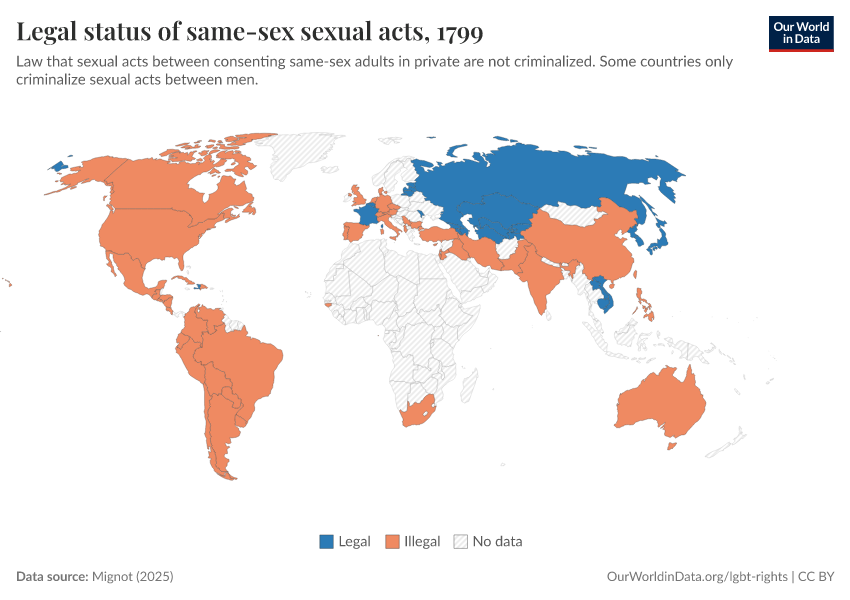Legal status of same-sex sexual acts

About this data
About this data
Sources and processing
This data is based on the following sources
How we process data at Our World in Data
All data and visualizations on Our World in Data rely on data sourced from one or several original data providers. Preparing this original data involves several processing steps. Depending on the data, this can include standardizing country names and world region definitions, converting units, calculating derived indicators such as per capita measures, as well as adding or adapting metadata such as the name or the description given to an indicator.
At the link below you can find a detailed description of the structure of our data pipeline, including links to all the code used to prepare data across Our World in Data.
Notes on our processing step for this indicator
From the original table, we constructed a new dataset with data for all countries between 1760 and 2025.
For countries where criminalization was implemented at different points in time across their regions, we considered the earliest year of the change as the year of criminalization. This is the case for the United States (1610-1948).
Conversely, for countries where decriminalization was implemented at different points in time across their regions, we considered the latest year of the change as the year of decriminalization. This is the case for Australia (1975-1997), Bosnia and Herzegovina (1998-2001), United Kingdom (1967-1982), and United States (1962-2003).
We consider the year of the last decriminalization of homosexuality in Germany to be 1969, the year it was decriminalized in West Germany. East Germany did it in 1968.
We modified the homosexuality status for Russia, Armenia, Azerbaijan, Estonia, Georgia, Kazakhstan, Kyrgyzstan, Latvia, Lithuania, Moldova, Tajikistan, Turkmenistan, and Uzbekistan before 1832 to "Legal" to reflect what it is mentioned on page 8 of the original paper ([the Russian Empire] have not criminalized these practices since at least the 18th century).
Reuse this work
- All data produced by third-party providers and made available by Our World in Data are subject to the license terms from the original providers. Our work would not be possible without the data providers we rely on, so we ask you to always cite them appropriately (see below). This is crucial to allow data providers to continue doing their work, enhancing, maintaining and updating valuable data.
- All data, visualizations, and code produced by Our World in Data are completely open access under the Creative Commons BY license. You have the permission to use, distribute, and reproduce these in any medium, provided the source and authors are credited.
Citations
How to cite this page
To cite this page overall, including any descriptions, FAQs or explanations of the data authored by Our World in Data, please use the following citation:
“Data Page: Legal status of same-sex sexual acts”, part of the following publication: Bastian Herre and Pablo Arriagada (2023) - “LGBT+ Rights”. Data adapted from Mignot. Retrieved from https://archive.ourworldindata.org/20250909-093708/grapher/legal-status-of-same-sex-sexual-acts.html [online resource] (archived on September 9, 2025).How to cite this data
In-line citationIf you have limited space (e.g. in data visualizations), you can use this abbreviated in-line citation:
Mignot (2025) – with major processing by Our World in DataFull citation
Mignot (2025) – with major processing by Our World in Data. “Legal status of same-sex sexual acts” [dataset]. Mignot, “Homosexuality criminalization data from Mignot” [original data]. Retrieved March 3, 2026 from https://archive.ourworldindata.org/20250909-093708/grapher/legal-status-of-same-sex-sexual-acts.html (archived on September 9, 2025).